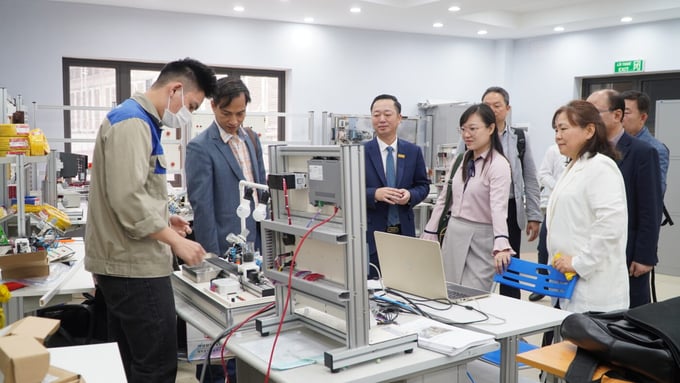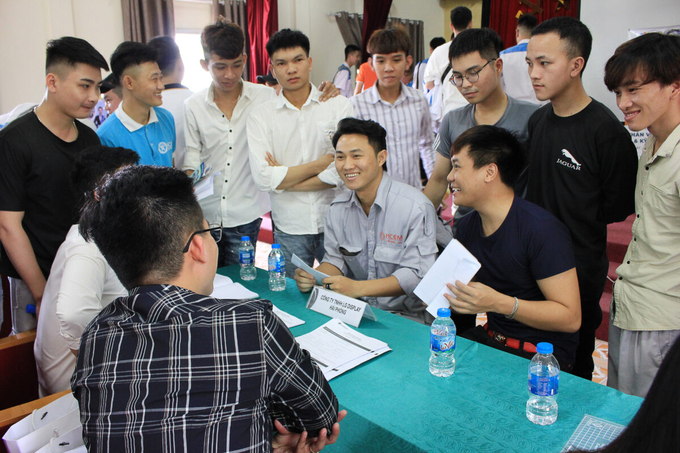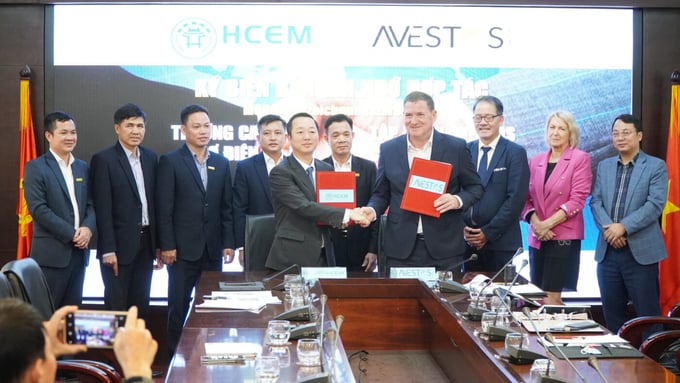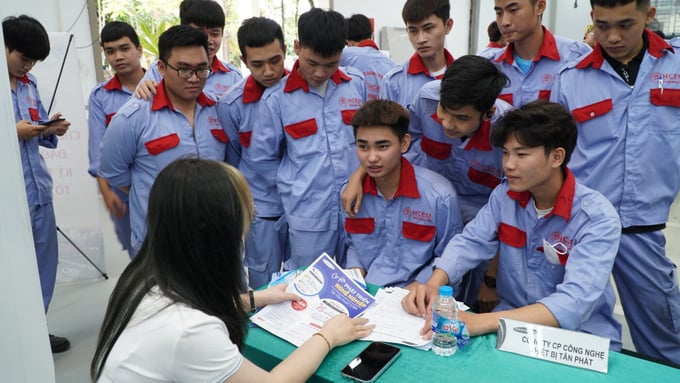May 20, 2025 | 19:31 GMT +7
May 20, 2025 | 19:31 GMT +7
Hotline: 0913.378.918
May 20, 2025 | 19:31 GMT +7
Hotline: 0913.378.918

Dr. Dong Van Ngoc (3rd from left), Rector of Hanoi College for Electro - mechanics, introducing the college to international partners. Photo: HA.
Before 2013, Hanoi College for Electro - mechanics (HCEM), like most other human resource training institutions, was inundated with difficulties. Infrastructure was lacking, enrollment was difficult, income was low, the number of business partners and affiliates could only be counted on one hand. But now, HCEM has become a leading training institution, specializing in training high-quality human resources.
As of 2023, HCEM has built a cooperation mechanism with nearly 160 domestic and foreign enterprises. The college is also an associate partner of international corporations such as Hanwha Group, DENSO Vietnam, Truong Hai Auto Company, Toyota Vietnam, AT Group, Festo Company, KNX Association, etc. Every year, the University enrolls 1,200 college students and 400 intermediate-level students, opens joint training programs for more than 5,000 employees.
The day reporters of Vietnam Agriculture News arrived, HCEM was about to start a new academic year. Dr. Dong Van Ngoc, Rector of HCEM, said that this year the college has a new breakthrough, which is "enrollment with recruitment". Right from the time students register for admission, the first thing is to "classify" the demands for domestic or foreign jobs, from which the school and the enterprise will have the appropriate training orientation. “The most important thing is to help students gain confidence in their future work and income right from the moment they step foot in the college gate”.

Job fair at Hanoi College for Electro - mechanics. Photo: HA.
According to the HCEM rector, the current situation of human resource training in schools is divided into three levels. The first level is the old-fashioned way, that is, what the college can offer, the college will train as such. The second is the association with businesses to conduct joint training. As for the third level, the school itself organizes training according to the orders from businesses and society.
“The alarming problem is that most of training institutions are still at the first level, so it is natural that they call the current situation “difficult” and cannot recruit students. The old mindset which only focuses on training what they have will lead to low employment rates for graduates. Even when applying to recruitment agencies, graduates have to go through retraining. Therefore, changing mindset is the first factor to "make a revolution" and improve human resource training quality today,” said Dr. Ngoc.
The participation of businesses in the HCEM’s training process not only stops at the support in terms of professional standards and technology standards, but they directly cooperate with the college in training excellent students to participate in vocational skills exams at all levels.
Along with innovating training methods, the college itself also has to transform by “raising the level” of teachers to match the education standards in the region and the world, aligning teachers' qualifications with the latest professional standards updates.

Thanks to changing mindset, HCEM now becomes a trusted partner of many large corporations. Photo: HA.
It is also the change of mindset that has helped HCEM become a facility famous for its training ability as per orders. The college has a long list of partners being large corporations, such as Hanwha Group - the only enterprise in the field of aviation engines in South Korea and one of the top 10 advanced technology companies in the world.
The cooperation program between HCEM and AT Group Japan is also a prime example, training high-quality human resources in the field of maintenance and repair of hybrid and electric cars in Vietnam. The last training course selected the first 28 students who met the criteria and passed the most rigorous tests from Japanese experts.
Regarding the commitment, businesses only need to issue a “headline” on human resources, HCEM will train. When due time, the college will organize a professional qualification test and graduates can go straight to the factory to work without having to retrain anything, even the work culture of each business. "That is the philosophy we have found in recent years, bringing efficiency to the college, effective for both students and businesses," said Dr. Ngoc.

After graduating from Hanoi College of Electro - mechanics, students can immediately meet the job requirements, units and businesses do not have to retrain. Photo: HA.
Agriculture is a very broad category. In order to develop agriculture, all other fields must also train human resources in service of the agricultural industry, not only processing, aquaculture, animal husbandry, animal health but also science and technology, processing, machinery, logistics, automation. With a system of 7 training facilities located in the capital area. Hanoi, Vinh Phuc, Hung Yen, HCEM is ready to take on the task of training high quality human resources for the agricultural industry.
"Our college’s training system always strives to identify how to make young people passionate and participate more and more in the field of agriculture. Associating with businesses, analyzing the needs of business and society, and customized training as per orders are our answers to that issue,” said Dr. Dong Van Ngoc, Rector of Hanoi College for Electro - mechanics.
Translated by Samuel Pham

(VAN) Japan's grant aid project contributes to capacity building, promoting organic agricultural production, and fostering sustainable community development in Dong Thap province.

(VAN) For years, the CRISPR-Cas9 genome technology has been reshaping genetic engineering, a precision tool to transform everything from agriculture to medicine.

(VAN) Vietnam aims to become a 'leader' in the region in the capacity and managing effectively soil health and crop nutrition.
![Reducing emissions from rice fields: [Part 1] Farming clean rice together](https://t.ex-cdn.com/nongnghiepmoitruong.vn/608w/files/news/2025/05/05/z6509661417740_a647202949c539012a959e841c03e1d3-nongnghiep-143611.jpg)
(VAN) Growing clean rice helps reduce environmental pollution while increasing income, allowing farmers to feel secure in production and remain committed to their fields for the long term.
/2025/05/19/5136-1-144800_230.jpg)
(VAN) The Nghe An Provincial People's Committee has just approved the list of beneficiaries eligible for revenue from the Emission Reductions Payment Agreement (ERPA) in the North Central region for the year 2025.

(VAN) 14 out of 35 domesticated elephants in Dak Lak province have had their living conditions improved, with 11 of them currently participating in the non-riding elephant tourism model.

(VAN) Muong Nhe Nature Reserve hopes that being upgraded to a national park will lay the foundation for forest protection efforts to be carried out in a systematic, modern, and sustainable manner.